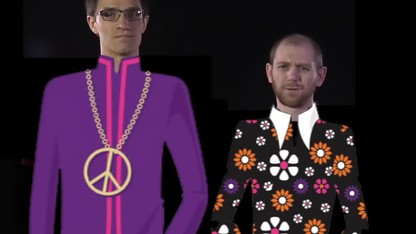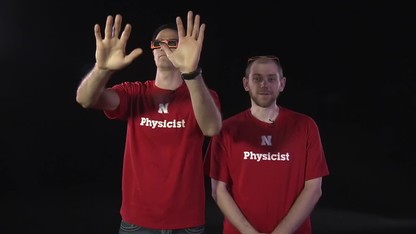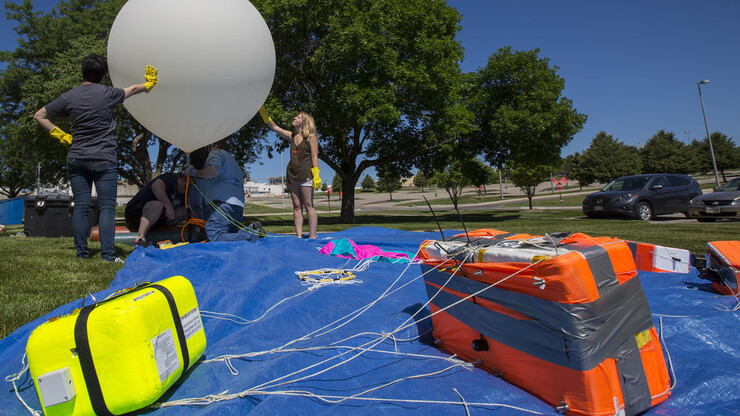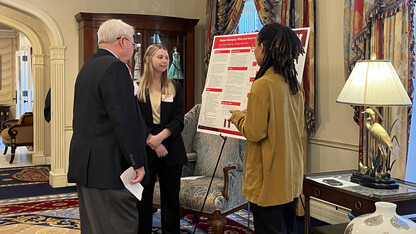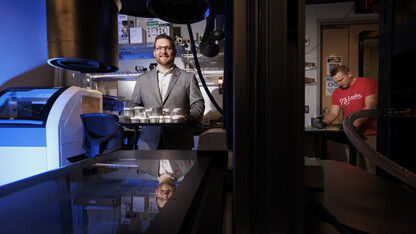· 6 min read
Are you ready for the eclipse?
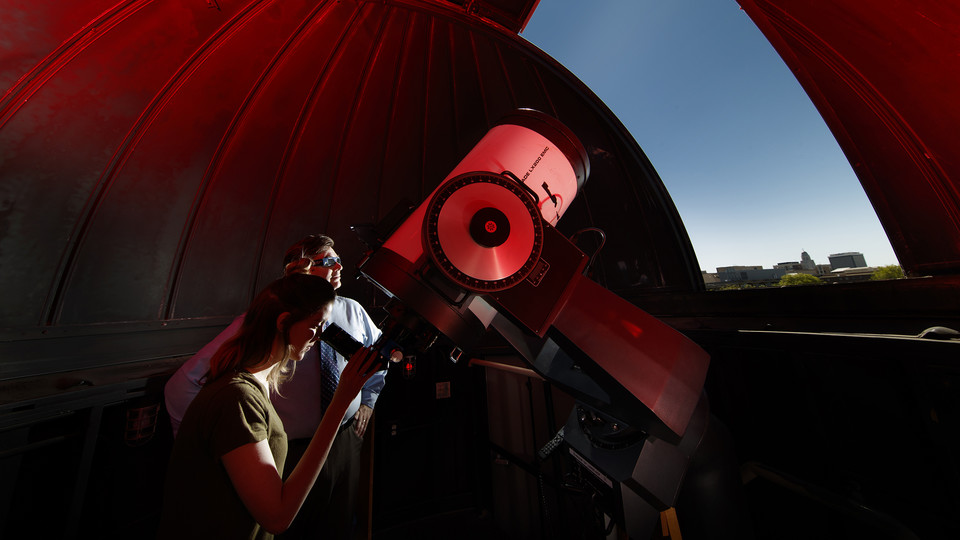
From livestream play-by-play to a quilt exhibition, the University of Nebraska–Lincoln will host a variety of events and be involved in research related to the total solar eclipse on Aug. 21.
Information, stories and links to campus-related eclipse events include:
Aug. 18
Planetarium Shows — Starting at 11 a.m., Mueller Planetarium will host a pair of shows related to the eclipse. “Earth, Moon and Sun” is geared toward younger audiences and explores the relationship between celestial bodies and common misconceptions about the universe. “Eclipses and Phases of the Moon” is for teens and adults, highlighting the science behind an eclipse. Learn more about these shows.
Public Viewing — The university will hold a public viewing night at Behlen Observatory, which is located near Mead, Nebraska, from 8 to 11 p.m. Telescopes will be available to view faint galaxies and star clusters. Rebecca Harbison, assistant professor of practice in physics and astronomy, will present a program on the eclipse. Learn more about the observatory.
Aug. 19
Rare Occurrence — The International Quilt Study Center and Museum celebrates the eclipse with a pop-up exhibition of nine quilts. The exhibit will be available for free viewing from 10 a.m. to 4 p.m. Learn more about the exhibition.
Planetarium Shows — Starting at 11 a.m., Mueller Planetarium will host a pair of shows related to the eclipse. “Earth, Moon and Sun” is geared toward younger audiences and explores the relationship between celestial bodies and common misconceptions about the universe. “Eclipses and Phases of the Moon” is for teens and adults, highlighting the science behind an eclipse. Learn more about these shows.
Public Viewing — View the night skies through Hyde Memorial Observatory, 3701 S. 70th St, from sundown to 11 p.m. The free, open-to-the-public event will feature three high-powered telescopes and presentations on the eclipse.
Aug. 20
SciPop Talks — The University Libraries and Lincoln Children’s Museum are offering a Solar Eclipse Pre-Party that will feature two SciPop Talks — presentations that combine science and popular culture — and two interactive lessons. The talk topics are “Football Physics” and “Comic Book Physics 101.” The interactive lessons are “Potions of Harry Potter” and “Solar Eclipse Facts and Fun.” The family-friendly event begins at 2 p.m. Learn more about the event.
Rare Occurrence — The International Quilt Study Center and Museum celebrates the eclipse with a pop-up exhibition of nine quilts. The exhibit will be available for free viewing from 1 to 4 p.m. Learn more about the exhibition.
Public Viewing — View the night skies through the university’s student observatory atop the Stadium Drive parking garage. The event, which is 8 to 11 p.m., will also include presentation on the eclipse.
Aug. 21
Time — The eclipse process will last 2 hours and 52 minutes, starting around 11:35 a.m. The sun will be completely blocked by the moon for nearly 90 seconds, starting about 1:03 p.m. The eclipse process will end by 2:30 p.m. Access a solar eclipse interactive map.
Special Glasses Needed — The university will distribute solar glasses at some back-to-school events and at multiple campus locations on Aug. 21. It is not safe to look directly at the sun during the eclipse process as it can cause retina damage. The sun can be viewed safely with the glasses during the eclipse or by the naked eye when the sun is completely blocked. On the day of the eclipse, solar glasses will be distributed on City and East campuses. The glasses will be available at City Campus residence hall dining halls; starting at 9 a.m. near Meier Commons, the plaza north of the Nebraska Union and the north side of Love Library North; and at 11 a.m. on the East Campus Mall, near Oldfather Hall, between Hamilton Hall and Sheldon Museum of Art, and the green space south of Manter Hall. The glasses will be available on a first-come, first-served basis. Primary campus watch areas include the green space north of the Nebraska Union and East Campus Mall. Learn more about the eclipse.
Class is in Session — The eclipse will occur on the first day of the fall 2017 semester and classes are not being canceled. However, Donde Plowman, executive vice chancellor and chief academic officer, has encouraged faculty with courses scheduled during the eclipse to interrupt class if possible.
Live Play-by-Play — The university will livestream play-by-play of the eclipse from the student observatory atop the Stadium Drive parking garage. The play-by-play will include Dan Claes, professor and chair of physics and astronomy; Tim Gay, professor of physics and astronomy; and Richard Green, astronomy professor at the University of Arizona. The livestream, which is 11:30 a.m. to 1 p.m., will be available on the Nebraska homepage and via university social media pages.
Tune In — The university has created a playlist to commemorate the eclipse. The list, “Total Eclipse of the Heartland,” is available via Spotify.
Take Me Out to the Ballgame — The university will host a science and engineering expo in conjunction with the Aug. 21 Lincoln Saltdogs baseball game at Hawks Field. The science fair, which begins at 11 a.m., will feature 15 stations with activities led by Nebraska students, faculty and staff. The Saltdogs have partnered with the Department of Physics and will stop the game during the 90 seconds of total eclipse. The game, which starts at noon, will also feature a series of university-made videos about the eclipse and the live stream play-by-play.
